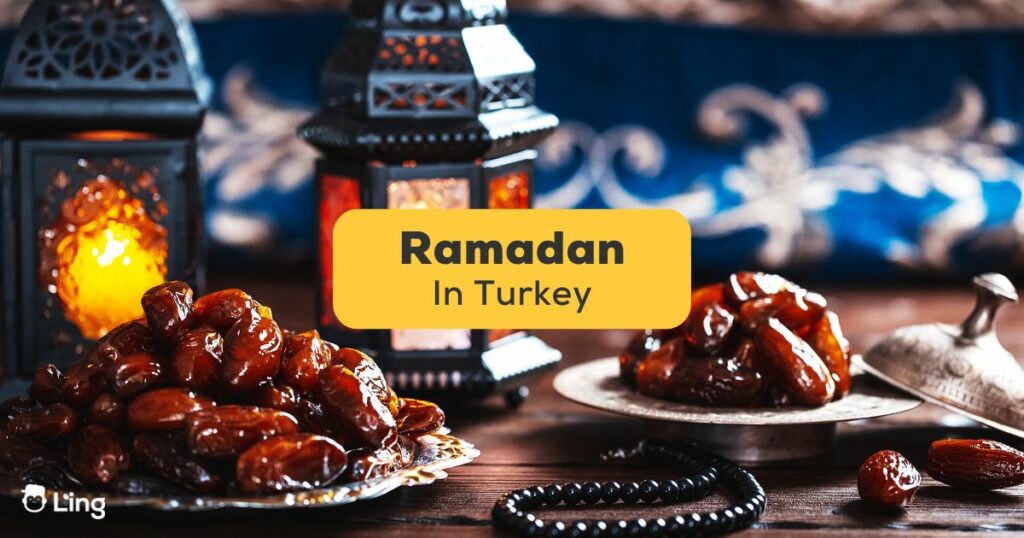If you’re an expat living in Turkey, you’ll probably hear people talking about the arrival of Ramadan. If you want to learn what it is and how it’s observed and celebrated in Turkey, keep reading!
Ramadan is an important holy month for Muslims worldwide. Since it’s a predominantly Muslim country, many people observe Ramadan in Turkey. During that time, you’ll experience a festive atmosphere I’m sure you haven’t experienced at any other time.
In this article, you’ll learn how Ramadan is observed and celebrated by Turkish people from a local perspective. In fact, I’m already fasting while writing this blog post!
What Is Ramadan?
Ramadan is the 9th month in the Islamic calendar, in which fasting is observed. Fasting (oruç tutmak) is actually one of the Five Pillars of Islam. During this holy month, Muslims don’t eat during daylight hours, breaking their fasts when the sun sets and the evening adhan is recited from the mosques. Additionally, believers also perform prayers, such as praying the salaat five times a day, reading the Quran, and giving charity.
Before we move further, I’d like to mention some important Islamic vocabulary that repeats throughout the article so you can understand it better.
- Adhan (Ezan): Adhan is the Islamic call to prayer, a melodic Arabic recitation that’s delivered by a muezzin (one who calls for prayer) from a mosque’s minaret.
- Salaat (Namaz): Also known as Salah, this is the Islamic term for ritual prayer. It’s one of the Five Pillars of Islam and holds significant importance in the faith. Muslims perform salaat five times a day, facing the Kaaba in Mecca.
- Tarawih (Teravih): Tarawih refers to special prayers performed by Muslims during Ramadan. These prayers are conducted at night after the Isha (night) prayer and are considered optional but highly recommended.
- Iftar (İftar): This is the meal with which Muslims break their fast during Ramadan, at sunset. It’s a significant social and religious event, often shared with family and friends.
- Suhoor (Sahur): Sahur refers to the pre-dawn meal consumed by Muslims before beginning their fast during Ramadan. It’s eaten before the Fajr (dawn) time and is intended to provide sustenance for the day ahead.
When Is Ramadan In 2024?
The holy Ramadan starts on March 11 and ends on April 9, 2024. It’s followed by the Eid al Fitr (Ramazan bayramı), which is a feast to celebrate the ending of Ramadan.
Ramadan In Turkey
As we mentioned, Ramadan is a holy month in which Muslims fast. During this time, certain human needs, such as eating, drinking, and sexual intercourse, should be avoided from sunrise to sunset. During the month of Ramadan, special tarawih prayers are performed in mosques, and people prepare iftar tables to break their fast together.
In the month of Ramadan in Turkey, iftar tents (iftar çadırı) are set up in major streets and squares so that people break their fasts in unity. Also, many traditional dishes from Turkish cuisine are specially prepared and served at these tables.
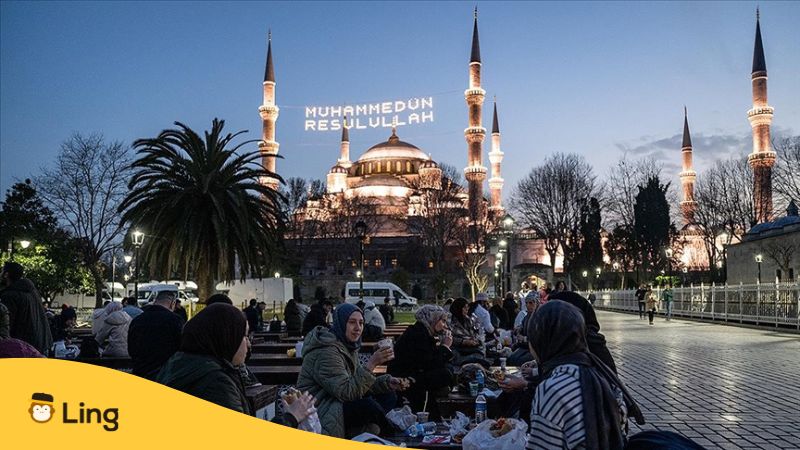
Crowded Iftar Meal
During Ramadan, people prepare iftar gatherings for charity purposes on the streets or as an event to host guests at their homes. There are many alternatives for organizing an iftar charity. For example, it’s possible to set up iftar tables to share with large audiences by contacting municipalities or non-governmental organizations.
In addition, the happiness of breaking your fast at crowded tables with your family, relatives, friends, and neighbors is something else for locals.
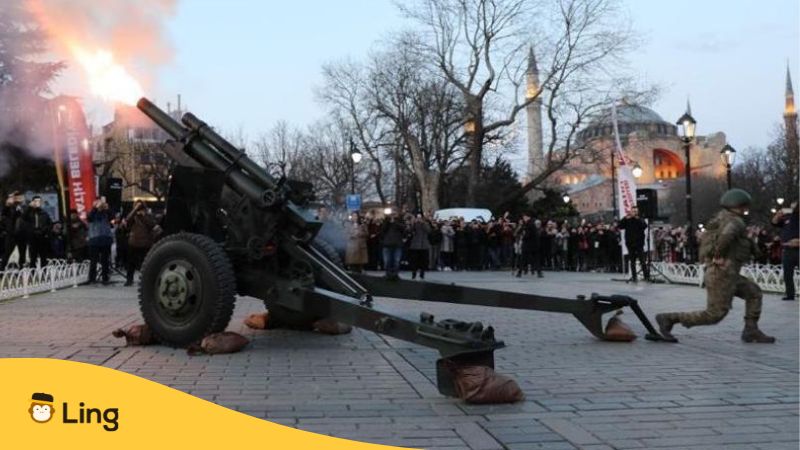
Firing Cannonballs
Yes, you read it right, we fire cannonballs in Ramadan. The tradition of firing cannons at iftar times dates back to the Ottoman Era. It started in Rumeli Fortress during the reign of Sultan Mustafa III and then spread throughout the country. Today, cannons are fired in the highest points of cities to announce the evening call to prayer and to inform people that it’s time to break their fasts.
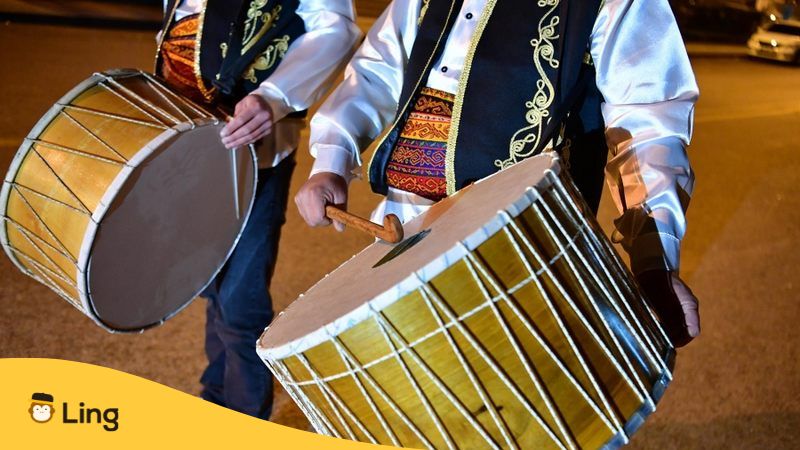
Ramadan Drummers
One of the oldest and most joyful traditions for this time is Ramadan drummers (Ramazan davulcusu), a tradition that belongs to Turkish-Islamic culture. In ancient times, during this month, the Ramadan drummer would go from street to street with a few people and take turns singing Ramadan songs and drumming. Although this tradition is about to become ancient history, today, these drummers still wander around alone and continue to cheer up the night with their drums and wake up people for sahur.
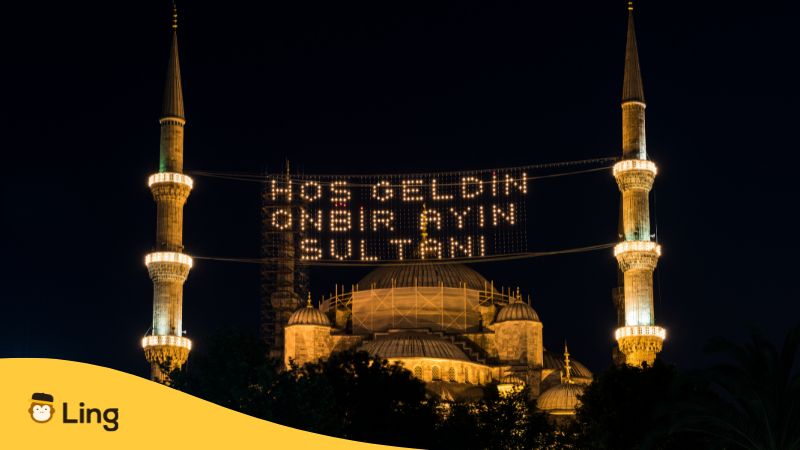
Mahya Art
Mahya is the art of writing Ramadan expressions with oil lamps between the double minarets of mosques. This tradition has survived from the Ottoman Empire to the present day. In earlier times, the arrival of Ramadan was announced to the public this way. Today, mosques with shining mahya continue to reflect the joy of Ramadan in Turkey.
Ramadan Specials In Turkish Cuisine
You already know how delicious and unique traditional Turkish cuisine is, but did you know that there are special culinary delights that you can only find during Ramadan?
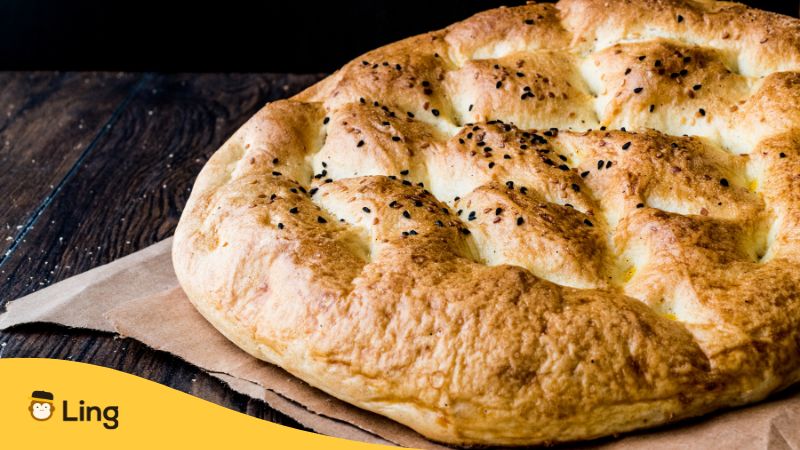
Ramadan Flatbread (Ramazan Pidesi)
You have no idea how hard it is to resist the smell of freshly baked pide rising from the bakeries as iftar time approaches!
Pide is a type of leavened and flat bread specially baked for Ramadan, and it’s had an important place in Turkish culinary culture for about 500 years. Shaping and baking a beautiful pide is a laborious task that requires skill. It’s made from a dough that is not suitable for mass production, and therefore, it’s only produced during Ramadan.
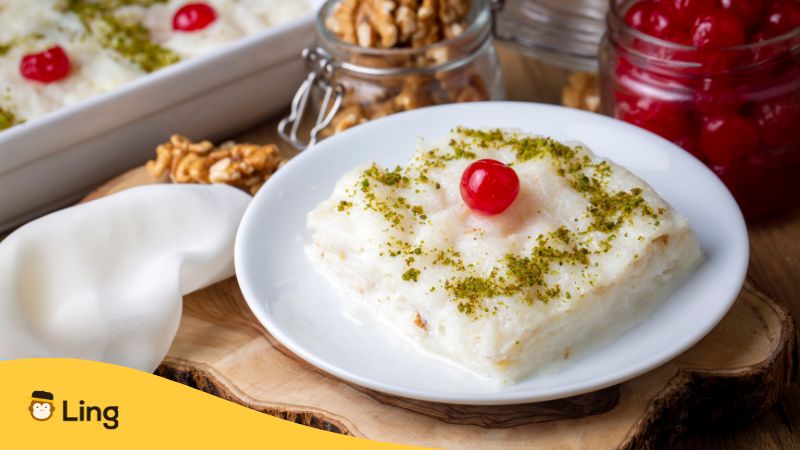
Güllaç Dessert
If you’re a fan of light and milky desserts, you’ll absolutely love Güllaç!
Güllaç dessert, which has survived from the Ottoman Ramadan culture to the present day, is made with rice wafers prepared from corn starch and water. The first known Güllaç recipe dates back to the 13th century, and over time, it became indispensable to Ottoman palace cuisine. Today, it’s the most loved dessert for Ramadan since it’s a milk dessert that is easy to digest.

Sherbet (Şerbet)
Ottoman sherbet is a traditional Ramadan drink with a history of over 600 years. It’s made using a wide variety of fruits and spices such as cinnamon, tamarind, hibiscus, ginger, rose, licorice, cranberry, pomegranate, quince, and lavender, with additional sweeteners such as honey or sugar. This refreshing cold drink remains an indispensable part of today’s iftar menus.
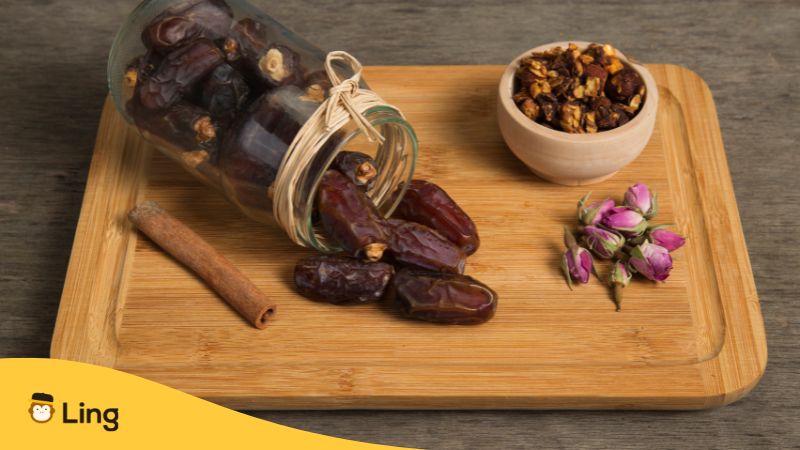
Date (Hurma)
Breaking the fast with dates is one of the oldest Ramadan traditions, since Prophet Muhammad would break his fast this way. Even today, dates are among the must-have items on Ramadan tables.
Ramadan Vocabulary In Turkish
Since this might be your first Ramadan experience as an expat living in Turkey, learning some Ramadan vocabulary will come in handy!
| English | Turkish |
|---|---|
| Month of Ramadan | Ramazan ayı |
| Happy Ramadan! | Hayırlı Ramazanlar! |
| Ramadan Feast (Eid al Fitr) | Ramazan Bayramı |
| Fasting | Oruç tutmak |
| Are you fasting? | Oruç tutuyor musun? |
| I am fasting. | Oruç tutuyorum. |
| I am not fasting. | Oruç tutmuyorum. |
| When is iftar? | İftar ne zaman? |
| I’m hungry. | Acıktım. |
| Pre-dawn meal (before fasting begins) | Sahur |
| Breaking the fast (meal at sunset) | İftar |
| Taraweeh prayer | Teravih namazı |
| Call to prayer (Adhan) | Ezan |
| Ramadan flatbread | Ramazan pidesi |
| Fajr (pre-dawn) time | İmsak vakti |
| Evening | Akşam |
| Peace | Huzur |
| Blessings/abundance | Bereket |
| Prayer | Dua |
| To break the fast | Oruç açmak |
| Charity/alms-giving | Sadaka |
| Goodness | İyilik |
| Mercy | Rahmet |
| Blessed days | Bereketli günler |
| Read the Qur’an | Kur’an okumak |
Want to learn more phrases to impress the locals? Use the Ling app and start learning useful Turkish for expats! You can download it from the App Store or Play Store and get a free 7-day trial!
Ready For Ramadan Celebrations In Turkey?
Now that you’ve learned about this holy month, why don’t you try fasting for a few days and making iftar meals with the locals? This way, you can experience observing Ramadan in Turkey and bond with them as an expat.
Of course, don’t feel pressured! You are not expected to do it at all, because Turkey is one of the most liberal Islamic countries. Its significant secular population doesn’t fast or pray. So, try it only if you want to share a common feeling with locals and blend in with the culture!
And if you want to learn more about Turkish culture and language, check out the other posts on Ling’s Turkish blog!
